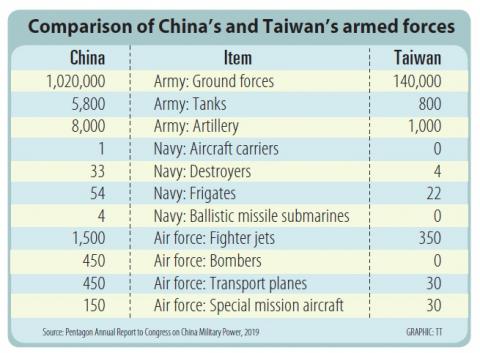Analysts and legislators urged the government to step up the nation’s asymmetric warfare capabilities, after the US Department of Defense issued a report on China’s military capabilities.
The report, released on Thursday, said that the west and northwest of Taiwan are in range of the People’s Liberation Army’s (PLA) air defense missiles, Institute of National Defense and Security Research analyst Su Tzu-yun (蘇紫雲) said.
The Ministry of National Defense’s decision to replace Northrop F-5Es at Chihhang Air Base in Taitung with F-16Vs is vindicated by the report’s findings, he said.

Basing Taiwan’s most advanced tactical aircraft at Chihhang would put them beyond the reach of Chinese surface-to-air missile fire during takeoff, Su said.
The military should also enhance its arsenal of surface-to-air and shore-based anti-ship missiles that, in conjunction with Japan’s anti-ship missile batteries at Miyakojima in Okinawa Prefecture, could block the PLA’s access to the Pacific from the first island chain, he said.
The report identified three possible forms of Chinese aggression toward Taiwan: large-scale missile attacks, limited attacks by precision-guided munitions or an amphibious assault, Chinese-language Military Link Magazine editor-in-chief Chen Wei-hao (陳維浩) said.
No nation has ever surrendered to missile attacks alone, so Beijing could well find that it has no alternative but to stage an amphibious assault if it wishes to bend Taiwan to its will, Chen said.
Mounting an amphibious invasion of Taiwan could be a daunting prospect for China, as such military action risks domestic stability and could lead to armed intervention by other states, he said.
While China is unlikely to achieve victory with missile fire alone, the improved range of its modern missiles poses a “huge threat,” as the military’s plans to escape missile fire by moving units east could be rendered obsolete, Chen said.
“The urgent task is conceiving a response that would actually implement the principles of asymmetric warfare, especially with regard to disrupting the communist forces’ ability to push supplies and reinforcements to the front,” he said.
Regarding the report’s conclusion that the PLA could commit its sole aircraft carrier to battle, Chen said the Liaoning has more propaganda than combat value.
Accounting for maintenance cycles, a minimum of three carriers is needed to make a strategic impact, Chen said.
Chinese naval aviation would not pose a serious threat for the next 10 to 15 years, he said.
Democratic Progressive Party Legislator Wang Ting-yu (王定宇) said the report suggests that the US’ armed forces are actively preparing to defend the region.
Taiwan’s military defenses are acceptable, but the military should keep improving the mobility of its units and therefore their survivability, he added.
Ministry spokesman Major General Chen Chung-chi (陳中吉) said that the nation’s armed forces continue to observe trends and exercise control over the airspace and maritime zones around the nation.
“The military will, as the president has said, yield not an inch of the nation’s sovereign territory or an iota of our freedoms and democracy,” he said.

SECURITY: As China is ‘reshaping’ Hong Kong’s population, Taiwan must raise the eligibility threshold for applications from Hong Kongers, Chiu Chui-cheng said When Hong Kong and Macau citizens apply for residency in Taiwan, it would be under a new category that includes a “national security observation period,” Mainland Affairs Council (MAC) Minister Chiu Chui-cheng (邱垂正) said yesterday. President William Lai (賴清德) on March 13 announced 17 strategies to counter China’s aggression toward Taiwan, including incorporating national security considerations into the review process for residency applications from Hong Kong and Macau citizens. The situation in Hong Kong is constantly changing, Chiu said to media yesterday on the sidelines of the Taipei Technology Run hosted by the Taipei Neihu Technology Park Development Association. With

CARROT AND STICK: While unrelenting in its military threats, China attracted nearly 40,000 Taiwanese to over 400 business events last year Nearly 40,000 Taiwanese last year joined industry events in China, such as conferences and trade fairs, supported by the Chinese government, a study showed yesterday, as Beijing ramps up a charm offensive toward Taipei alongside military pressure. China has long taken a carrot-and-stick approach to Taiwan, threatening it with the prospect of military action while reaching out to those it believes are amenable to Beijing’s point of view. Taiwanese security officials are wary of what they see as Beijing’s influence campaigns to sway public opinion after Taipei and Beijing gradually resumed travel links halted by the COVID-19 pandemic, but the scale of

A US Marine Corps regiment equipped with Naval Strike Missiles (NSM) is set to participate in the upcoming Balikatan 25 exercise in the Luzon Strait, marking the system’s first-ever deployment in the Philippines. US and Philippine officials have separately confirmed that the Navy Marine Expeditionary Ship Interdiction System (NMESIS) — the mobile launch platform for the Naval Strike Missile — would take part in the joint exercise. The missiles are being deployed to “a strategic first island chain chokepoint” in the waters between Taiwan proper and the Philippines, US-based Naval News reported. “The Luzon Strait and Bashi Channel represent a critical access

Pope Francis is be laid to rest on Saturday after lying in state for three days in St Peter’s Basilica, where the faithful are expected to flock to pay their respects to history’s first Latin American pontiff. The cardinals met yesterday in the Vatican’s synod hall to chart the next steps before a conclave begins to choose Francis’ successor, as condolences poured in from around the world. According to current norms, the conclave must begin between May 5 and 10. The cardinals set the funeral for Saturday at 10am in St Peter’s Square, to be celebrated by the dean of the College